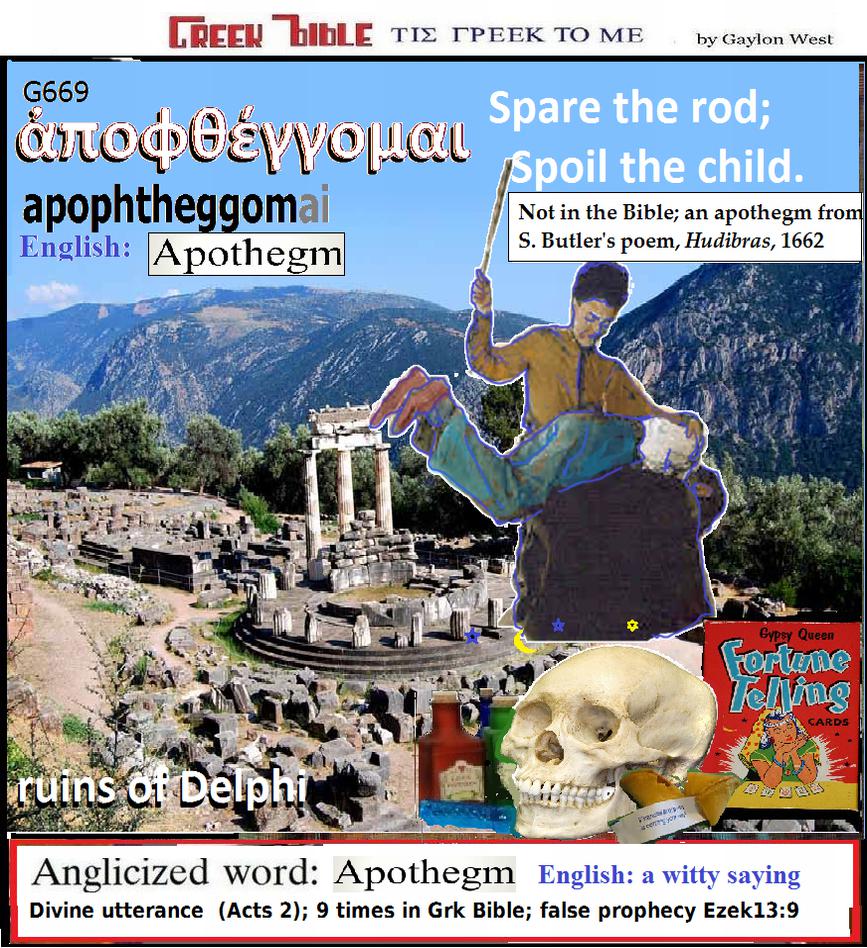 https://biblestudylessons.net/Comics/Greek%20to%20me/menu.html
https://biblestudylessons.net/Comics/Greek%20to%20me/menu.html
EARTHLY
TONGUES,
BUT HEAVENLY MESSAGE
PART 4 OF SERIES, "PENTECOSTAL SOUNDS"
If you have ever studied ancient history, you have no doubt read of the "prophecies" made at the Greek temple of Delphi. It was called an "oracle." This oracle would respond to questions of citizens, foreigners, kings, and philosophers on issues of politics, war, duty, crime, laws—even personal issues. Croesus, king of Lydia around 560 B.C., consulted Delphi before attacking Persia, and according to Herodotus was told, "If you cross the river, a great empire will be destroyed." Encouraged, Croesus crossed the river and attacked; the prophecy turned out to be true! Unfortunately for him, it was his own empire that was destroyed by the Persians."i
Years ago, there were personal weight scales outside of stores, so that if you had a penny, you could get a fortune printed along with your weight. The fortunes were so fascinatingly written that each fortune could satisfy any child. At any rate I'm glad that I never had one that said, "Tomorrow you will die", or "You will become a were wolf" like Larry Talbot's prediction from a gypsy in the movie, "The Wolf Man." I would have taken it too much to heart.
 https://biblestudylessons.net/Comics/Greek%20to%20me/menu.html
https://biblestudylessons.net/Comics/Greek%20to%20me/menu.html
The Chaldean wise men told Nebuchadnezzar, whose demand was to explain his prophetic dream, "there is none other that can shew it before the king, except the gods, whose dwelling is not with flesh" (Daniel 2:11). Genuine prophecies of the future can only come from God and consequently this is one proof for the divine origin of the Bible.
There are at least two Greek words used in the Bible when referring to inspired messages from heaven. One of them is logionG3051 translated as "oracles" in Acts 7:38. The other word apophtheggomaiG669 is used in Acts 2:4 for this Pentecost miracle. The apostles spoke as the Holy Spirit of God gave them apophtheggomai; i.e. "utterance."
Thayerii defines it as "to speak out, speak forth, pronounce; not a word of everyday speech but one 'belonging to dignified and elevated discourse'." Please notice that Thayer is not saying that this is an unintelligible gibberish. A "discourse" according to Merriam-Webster is "the use of words to exchange thoughts and ideas." The Greek implies then that when the Holy Spirit gave them "utterance", they had something important to say and they said it in a dignified manner.
But wait. There's more to apophtheggomaiG669 than the effective delivery. Robertsoniii explains that this Greek word "is a late verb (LXX (OT) of prophesying, papyri)." Vincentiv elaborates that it is a word that Greek writers "used of the utterances of oracles or seers. So in the LXX (OT), it is used of 'prophesying' (1 Chronicles 25:1; Deuteronomy 32:2; Zechariah 10:2; Ezekiel 13:19)." The KJV gives "who should prophesy" for 1 Chronicles 25:1.
The soothsayers in the Old Testament passages were identified as falsely presenting prophecy. The word is used on the day of Pentecost in Acts 2 to identify true prophets, the apostles.
This article does not pretend to prove the uniqueness of the many fulfilled prophecies of the Bible compared to the quagmire of soothsayings in today's world. It is sufficient if I have illuminated your understanding of the uniqueness that the occurence here in Jerusalem on that day of Pentecost where the foundation for our faith began .
There was a rushing might wind sound that was God's phone call to the multitude to come and listen to my message. The people from various countries were amazed that the apostles were speaking in glossaG1100 "our tongues" (said the people) which the people could understand. Not only that, they were speaking in the very local dialects ("our language") of the people. The people understood the apostles' prophetic message (utterance from the Holy Spirit) of the wonderful deeds of God.
Earthly Tongues But A Heavenly Message. We can have the confidence of what Peter and the others said that day and throughout their ministry in the first century because they spoke and wrote as the Spirit gave them utterance. Jesus told the apostles, "Howbeit when he, the Spirit of truth, is come, he will guide you into all truth: for he shall not speak of himself; but whatsoever he shall hear, [that] shall he speak: and he will shew you things to come. He shall glorify me." (John 16:13,14a).
Indeed, when one studies Acts 2:38 in the Greek, one can conclude that the "gift of the Holy Spirit" is something that the hearers were to actively accept ("shall receive"; an active middle voice verb and not a passive voice as indicated by the English). The ONLY thing offered the multitude by the apostles from the Holy Spirit was their message. The ONLY thing received by the multitude was what they heard from Peter, etc.; i.e., the message from the Holy Spirit. In the Greek it is called apophtheggomaiG669: God's prophetic Word.
- Gaylon West
Throw Out the Lifeline
ihttp://en.wikipedia.org/wiki/Oracle. Accessed 3/17/2014.
iiThayer's Greek Definitions.
iii Robertson's Word Pictures of the New Testament.

|